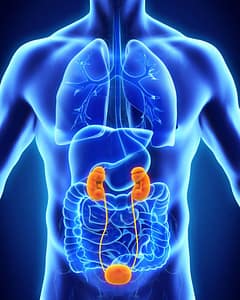kidney infection symptoms
Kidney infections, also known as pyelonephritis, can cause a wide range of symptoms.
Pain in the back, side, or groin
Fever
Chills
Nausea and vomiting
Loss of appetite
Fatigue
Difficulty urinating or abnormal urine
Strong or foul-smelling urine
Cloudy or bloody urine
Pain or pressure while urinating
If you are experiencing any of these symptoms, it is important to see a healthcare provider as soon as possible, as kidney infections can be serious and can cause permanent damage if left untreated.
Pain in the back, side, or groin In kidney infection
Yes, pain in the back, side, or groin is a common symptom of a kidney infection. The pain is usually located in the area where the kidneys are located, which is in the back, just below the ribcage on either side of the spine. The pain may be sharp or dull, and it may be constant or come and go. In addition to pain, you may also experience other symptoms such as fever, chills, nausea and vomiting, loss of appetite, fatigue, and difficulty urinating. If you are experiencing any of these symptoms, it is important to see a healthcare provider as soon as possible, as kidney infections can be serious and can cause permanent damage if left untreated.
 |
| kidney infection symptoms |
fever in kidney infection
Kidney infections, also known as pyelonephritis, can cause a fever as a symptom. The fever may be mild or high, and it can occur along with other symptoms such as abdominal pain, back pain, and chills. If you have a kidney infection, it is important to see a doctor as soon as possible, as the infection can cause serious complications if left untreated. Treatment typically involves antibiotics and may also include pain medication and fluids to help flush the bacteria out of your body.

chills in kidney infection
Kidney infections, also known as pyelonephritis, can cause a range of symptoms including chills. Other symptoms of a kidney infection may include fever, back pain, abdominal pain, and frequent urination. If you are experiencing chills and believe you may have a kidney infection, it is important to see a doctor for proper diagnosis and treatment. Kidney infections can be serious and can lead to permanent kidney damage if left untreated.
nausea vomiting in kidney infection
Nausea and vomiting are common symptoms of kidney infections. Other symptoms may include fever, chills, abdominal pain, and frequent urination. If you are experiencing these symptoms, it is important to see a doctor as soon as possible as kidney infections can be serious if left untreated. Treatment for kidney infection may include antibiotics and pain medication. It is important to finish the entire course of treatment as prescribed by your doctor to ensure that the infection is fully cleared.
loss of appetite in kidney infection
A kidney infection, also known as pyelonephritis, can cause a loss of appetite as well as other symptoms such as fever, abdominal pain, and fatigue. If you are experiencing a loss of appetite along with other symptoms of a kidney infection, it is important to seek medical attention as soon as possible. Treatment for a kidney infection typically involves a course of antibiotics. It is important to follow the treatment plan prescribed by your doctor to fully recover from the infection. In the meantime, it may be helpful to try to eat small, frequent meals and choose foods that are easy to digest and high in nutrients. Drinking plenty of fluids, including water, broth, and juices, can also help to keep you hydrated and promote healing.

fatigue in kidney infection
Kidney infections can cause a range of symptoms, including fatigue. This can be due to the infection itself, as well as any inflammation or damage that the infection is causing to the kidneys. In addition to fatigue, kidney infections may also cause other symptoms such as:
Pain in the back, side, or lower abdomen
Fever and chills
Nausea and vomiting
Urinating more frequently or experiencing pain while urinating
Cloudy or bloody urine
If you are experiencing these symptoms, it is important to see a doctor as soon as possible, as kidney infections can be serious if left untreated. The doctor will likely prescribe antibiotics to treat the infection and may also recommend pain medication to help manage any discomfort you may be experiencing. It is important to follow the treatment plan as prescribed by your doctor to fully recover from the infection.
Difficulty urinating or abnormal urine in kidney infection
Kidney infections, also known as pyelonephritis, can cause difficulty urinating or abnormal urine. The urine may appear cloudy, bloody, or foul-smelling. Other symptoms of a kidney infection may include pain in the side or back, fever, chills, and nausea. If you are experiencing these symptoms, it is important to see a doctor as soon as possible, as a kidney infection can be serious if not treated promptly. The doctor may prescribe antibiotics to treat the infection and may recommend drinking plenty of fluids to help flush bacteria out of the urinary system. In severe cases, hospitalization may be necessary.
Strong or foul-smelling urine
Strong or foul-smelling urine can be a sign of a variety of health issues. It can be caused by something as simple as what you have eaten or drunk, or it can be a sign of a more serious health condition. Some possible causes of strong or foul-smelling urine include:
When you are dehydrated, your urine becomes concentrated and may have a strong smell.
: UTIs can cause urine to have a strong, foul smell and may also cause pain or burning when urinating.
: Certain liver diseases, such as liver failure, can cause strong-smelling urine.
Some medications, such as antibiotics, can cause urine to have a strong or unusual smell.
A kidney infection can cause fever, back pain, and strong-smelling urine.
Yes, a kidney infection can a big cause strong or foul-smelling urine. A kidney infection, also known as pyelonephritis, is a type of urinary tract infection (UTI) that affects the kidneys. In addition to strong or foul-smelling urine, a kidney infection can cause other symptoms.
If you have a kidney infection, it is important to see a healthcare provider for proper diagnosis and treatment. Left untreated, a kidney infection can lead to serious complications. Your provider may prescribe antibiotics to treat the infection and may recommend drinking plenty of fluids to help flush bacteria out of your urinary tract.
If you are experiencing symptoms of a kidney infection, it is important to speak with a healthcare provider as soon as possible.
Cloudy or bloody urine in kidney infection
Cloudy or bloody urine can be a sign of a kidney infection. A kidney infection, also known as pyelonephritis, is a type of urinary tract infection that affects the kidneys. It can cause symptoms such as pain in the lower back or abdomen, fever, chills, and nausea. If you have cloudy or bloody urine and are experiencing any of these symptoms, you should see a doctor as soon as possible. A kidney infection can be serious if left untreated and may lead to more severe complications.
Pain or pressure while urinating in kidney infection
Pain or pressure while urinating can be a symptom of a kidney infection, also known as pyelonephritis. Other symptoms of a kidney infection may include fever, chills, abdominal pain, back pain, and nausea or vomiting. If you are experiencing these symptoms, it is important to see a doctor as soon as possible because kidney infections can be serious and may require treatment with antibiotics. If left untreated, a kidney infection can cause permanent damage to the kidneys and other organs.










